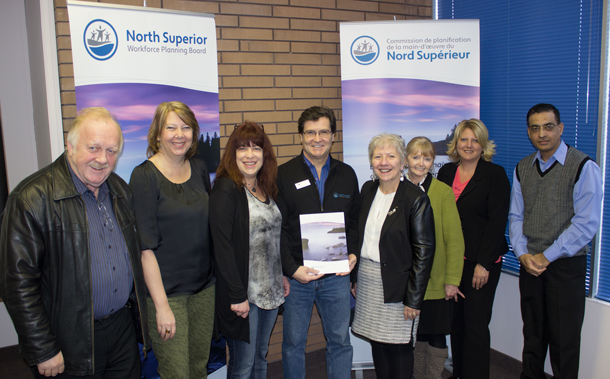
THUNDER BAY – BUSINESS – The North Superior Workforce Planning Board has issued a report on the skills that employers are looking for in the Natural Resources sector. The NSWPB Report was produced in response to difficulties that both job seekers and employers were experiencing when trying to match skills with jobs.
NSWPB Executive Director Madge Richardson stated, “There appears to be a mis-match between employer’s requirements and job seeker’s qualifications”.
Elaine Kerr the NSWPB Labour Co-Chair stated, “This report provides insight into what employers are looking for and will assist communicating those needs to individuals seeking employment.”
Business Co-Chair Frank Pullia commented, “Our region is facing a shortage of skilled workers. This study continues the Planning Board’s efforts”.
“We like to think of ourselves as the E-harmony of Workforce Planning,” said Pullia. “At the end of the day we have to provide prospective employees with the skills that they need to succeed.”
With the growth in Natural Resources employment expected, having this dialogue is important.

“How do we go and approach an employer?” asked Professor Chander Shahi. “Doing this lets prospective employees find out what skills they need.”
“Studies like this are a tremendous opportunity, we have done this at Lakehead University”. Shahi added, “This is why we moved to the Faculty of Natural Resources from the Faculty of Forestry”. The marketplace is changing and Natural Resources encompasses the entire trend and the opportunities in the region,.
The report was prepared with the Community Services Learning Program. This includes Lakehead University’s Faculty of Natural Resources Management.

Uli Walther, a member of the NSWPB and an employer here in Thunder Bay, commented that basic skills are key and that they are important at the high school level as well.
“What they ask is teamwork. But the teamwork between employer and schools are not a close as it could be”.
Professor Shani said, “Math and writing skills are an issue”.
Walther commented that if you ask many students “That twelve times twelve is, students don’t know”.
Discussion over how many students can handle technology is an issue. Texting, smartphones were raised as a concern. Students who are texting up to 3000 messages a month, or 100 a day was discussed, if students are texting all day, how are they paying attention?
The work by professors and students allowed the project to move forward with the latest information and provided students with the field practicum experience.
This is the second time that NSWPB and LU have worked together with Dr. Chander Shahi, the Associate Professor and Chair of the Forest Management Program.
Survey Questions
There were six questions asked in the survey.
Twenty-eight Natural Resource companies and eight non-resource based companies were surveyed.
Good work ethic was seen as the most important, the ability to take initiative was also highly ranked. Bush and outdoors experience were also important.
Confidence, enthusiasm, adaptability and problem solving were considered key. So was the ability to sell products.
Many of the skills were what is often seen as common requirements for many jobs.
Skills Shortfalls
Leadership and management skills, attitude, enthusiasm, paying attention to detail, solid communications skills and the ability to work independently.
Employers also identified the importance of multi-cultural sensitivity.
“It was very evident that many job seekers were seeking ‘a’ job, but not ‘that job’,” Richardson identified was an serious concern one employer noted.
Conclusions:
The preliminary analysis outlines that there is a mis-match. The report confirms the need for literacy, education, and skill development. A majority of employers identified the areas that they are looking for.
The report is valuable reading for prospective employees who are then going to be able to refine their education and skills training.
For education institutions, and employers the opportunities are present in the report. The report will be online at the North Superior Workforce Planning Board Website.
Next Steps:
The NSWPB is moving forward in the next steps for the study and are seeking a two-year internship to facilitate and promote experiential learning and maximizing apprenticeship opportunities.
Additionally, there will be a growing effort to develop partnerships with community partners.
For more information visit: www.nswpb.ca









